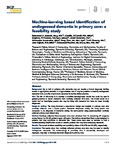Machine-learning based identification of undiagnosed dementia in primary care: a feasibility study
| dc.contributor.author | Jammeh, Emmanuel | |
| dc.contributor.author | Carroll, Camille | |
| dc.contributor.author | Pearson, SW | |
| dc.contributor.author | Escudero, J | |
| dc.contributor.author | Anastasiou, A | |
| dc.contributor.author | Zhao, P | |
| dc.contributor.author | Chenore, T | |
| dc.contributor.author | Zajicek, J | |
| dc.contributor.author | Ifeachor, Emmanuel | |
| dc.date.accessioned | 2018-06-18T14:05:36Z | |
| dc.date.available | 2018-06-18T14:05:36Z | |
| dc.date.issued | 2018-07 | |
| dc.identifier.issn | 1849-5435 | |
| dc.identifier.issn | 2398-3795 | |
| dc.identifier.other | bjgpopen18X101589 | |
| dc.identifier.uri | http://hdl.handle.net/10026.1/11675 | |
| dc.description.abstract |
<jats:sec><jats:title>Background</jats:title><jats:p>Up to half of patients with dementia may not receive a formal diagnosis, limiting access to appropriate services. It is hypothesised that it may be possible to identify undiagnosed dementia from a profile of symptoms recorded in routine clinical practice.</jats:p></jats:sec><jats:sec><jats:title>Aim</jats:title><jats:p>The aim of this study is to develop a machine learning-based model that could be used in general practice to detect dementia from routinely collected NHS data. The model would be a useful tool for identifying people who may be living with dementia but have not been formally diagnosed.</jats:p></jats:sec><jats:sec><jats:title>Design & setting</jats:title><jats:p>The study involved a case-control design and analysis of primary care data routinely collected over a 2-year period. Dementia diagnosed during the study period was compared to no diagnosis of dementia during the same period using pseudonymised routinely collected primary care clinical data.</jats:p></jats:sec><jats:sec><jats:title>Method</jats:title><jats:p>Routinely collected Read-encoded data were obtained from 18 consenting GP surgeries across Devon, for 26 483 patients aged >65 years. The authors determined Read codes assigned to patients that may contribute to dementia risk. These codes were used as features to train a machine-learning classification model to identify patients that may have underlying dementia.</jats:p></jats:sec><jats:sec><jats:title>Results</jats:title><jats:p>The model obtained sensitivity and specificity values of 84.47% and 86.67%, respectively.</jats:p></jats:sec><jats:sec><jats:title>Conclusion</jats:title><jats:p>The results show that routinely collected primary care data may be used to identify undiagnosed dementia. The methodology is promising and, if successfully developed and deployed, may help to increase dementia diagnosis in primary care.</jats:p></jats:sec> | |
| dc.format.extent | 0-0 | |
| dc.format.medium | Electronic-eCollection | |
| dc.language | en | |
| dc.language.iso | en | |
| dc.publisher | Royal College of General Practitioners | |
| dc.subject | GP practice | |
| dc.subject | NHS data | |
| dc.subject | Read code | |
| dc.subject | dementia | |
| dc.subject | machine learning | |
| dc.subject | primary care | |
| dc.title | Machine-learning based identification of undiagnosed dementia in primary care: a feasibility study | |
| dc.type | journal-article | |
| dc.type | Journal Article | |
| plymouth.author-url | https://www.ncbi.nlm.nih.gov/pubmed/30564722 | |
| plymouth.issue | 2 | |
| plymouth.volume | 2 | |
| plymouth.publication-status | Published | |
| plymouth.journal | BJGP Open | |
| dc.identifier.doi | 10.3399/bjgpopen18X101589 | |
| plymouth.organisational-group | /Plymouth | |
| plymouth.organisational-group | /Plymouth/Faculty of Health | |
| plymouth.organisational-group | /Plymouth/Faculty of Health/Peninsula Medical School | |
| plymouth.organisational-group | /Plymouth/Faculty of Science and Engineering | |
| plymouth.organisational-group | /Plymouth/Faculty of Science and Engineering/School of Engineering, Computing and Mathematics | |
| plymouth.organisational-group | /Plymouth/REF 2021 Researchers by UoA | |
| plymouth.organisational-group | /Plymouth/REF 2021 Researchers by UoA/UoA03 Allied Health Professions, Dentistry, Nursing and Pharmacy | |
| plymouth.organisational-group | /Plymouth/REF 2021 Researchers by UoA/UoA12 Engineering | |
| plymouth.organisational-group | /Plymouth/Research Groups | |
| plymouth.organisational-group | /Plymouth/Research Groups/FoH - Applied Parkinson's Research | |
| plymouth.organisational-group | /Plymouth/Research Groups/FoH - Community and Primary Care | |
| plymouth.organisational-group | /Plymouth/Research Groups/Institute of Translational and Stratified Medicine (ITSMED) | |
| plymouth.organisational-group | /Plymouth/Research Groups/Institute of Translational and Stratified Medicine (ITSMED)/CCT&PS | |
| plymouth.organisational-group | /Plymouth/Research Groups/Plymouth Institute of Health and Care Research (PIHR) | |
| plymouth.organisational-group | /Plymouth/Users by role | |
| plymouth.organisational-group | /Plymouth/Users by role/Academics | |
| plymouth.organisational-group | /Plymouth/Users by role/Researchers in ResearchFish submission | |
| dc.publisher.place | England | |
| dcterms.dateAccepted | 2018-03-01 | |
| dc.identifier.eissn | 2398-3795 | |
| dc.rights.embargoperiod | No embargo | |
| rioxxterms.funder | EPSRC | |
| rioxxterms.identifier.project | Novel Point-of-Care Diagnostic Techniques for Dementia | |
| rioxxterms.versionofrecord | 10.3399/bjgpopen18X101589 | |
| rioxxterms.licenseref.uri | http://www.rioxx.net/licenses/all-rights-reserved | |
| rioxxterms.licenseref.startdate | 2018-07 | |
| rioxxterms.type | Journal Article/Review | |
| plymouth.funder | Novel Point-of-Care Diagnostic Techniques for Dementia::EPSRC |


